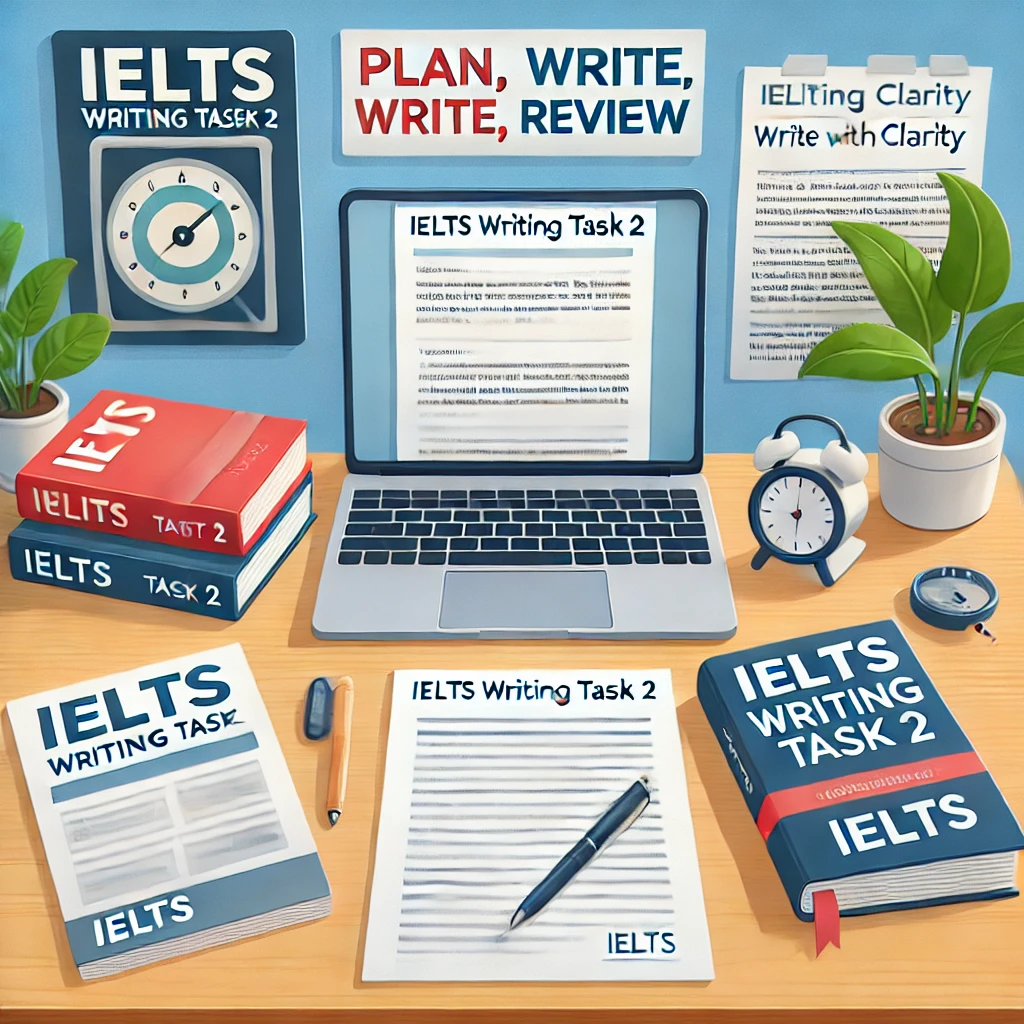IELTS General Writing Task 2 requires candidates to write an essay in response to a point of view, argument, or problem. This task evaluates your ability to present ideas clearly, develop an argument, and use appropriate language. With proper preparation and practice, you can excel in this section and achieve a high band score.
In this post, we’ll cover everything you need to know about IELTS General Writing Task 2, including structure, tips for each scoring criterion, and practical strategies to help you succeed.
Understanding the Task
Task 2 is an essay question that requires you to:
- Understand the question: Analyze the topic and type of essay (e.g., opinion, discussion, problem-solution).
- Write 250 words: Ensure your response is concise but fully developed.
- Complete the task in 40 minutes: Allocate time effectively to plan, write, and review your essay.
Pro Tip: Identify the essay type (agree/disagree, advantages/disadvantages, problem/solution, or discussion) and tailor your response accordingly.
1. Structuring Your Essay
A clear structure is crucial for coherence and cohesion. Follow this template:
Introduction (40-50 words)
- Paraphrase the question prompt to demonstrate your understanding of the topic.
- Clearly state your position or outline your essay’s approach.
Example:
Prompt: Some people think it is better for children to grow up in the countryside than in a city. Do you agree or disagree?
Introduction:
“While the countryside offers a serene and healthy environment, many believe the city provides better opportunities for children. This essay will argue why growing up in a city is more advantageous.”
Body Paragraphs (2-3 paragraphs, 200 words)
Each paragraph should focus on one main idea and include:
- A topic sentence that introduces the idea.
- Supporting arguments with examples or evidence.
- A concluding sentence that links back to the question.
Example Body Paragraph Structure:
- Main Point: “Cities provide better access to quality education and healthcare.”
- Evidence: “For example, urban areas often have a variety of schools with specialized programs and state-of-the-art medical facilities.”
- Conclusion: “Thus, growing up in a city can significantly enhance a child’s development.”
Conclusion (30-40 words)
Summarize your main points and restate your opinion or key argument.
Example:
“In conclusion, while the countryside offers certain benefits, the superior educational and healthcare opportunities in cities make them a better choice for children to grow up in.”
2. Writing for Each Scoring Criterion
IELTS Writing Task 2 is scored based on four key criteria:
1. Task Response (25%)
- Answer the question fully: Address all parts of the question and express your opinion clearly if required.
- Stay relevant: Avoid unnecessary details or off-topic information.
- Provide examples: Support your points with relevant examples or evidence.
2. Coherence and Cohesion (25%)
- Organize your ideas logically: Use paragraphs effectively, with clear connections between them.
- Use linking words: Employ cohesive devices like “however,” “therefore,” “in addition,” and “on the other hand” to connect ideas smoothly.
3. Lexical Resource (25%)
- Use varied vocabulary: Avoid repeating the same words. Use synonyms and idiomatic expressions appropriately.
- Use topic-specific words: For example, in an essay about education, use terms like “curriculum,” “academic achievement,” or “extracurricular activities.”
4. Grammatical Range and Accuracy (25%)
- Demonstrate grammar variety: Use simple, compound, and complex sentences.
- Avoid common errors: Check for subject-verb agreement, punctuation, and proper tense usage.
3. Time Management Strategies
Efficient time management is critical for success in Task 2:
- Plan (5 minutes): Brainstorm ideas and outline your essay structure.
- Write (30 minutes): Focus on developing your ideas clearly and logically.
- Review (5 minutes): Check for grammatical errors, spelling mistakes, and ensure you’ve answered the question fully.
4. Common Types of Essays and How to Approach Them
1. Opinion Essays (Agree/Disagree)
- Take a clear stance and stick to it throughout your essay.
- Example: “To what extent do you agree or disagree with the statement that online education is better than traditional classroom learning?”
2. Discussion Essays
- Present both sides of the argument and provide your opinion if asked.
- Example: “Some people believe social media has improved human communication. Others think it has negatively affected interpersonal relationships. Discuss both views.”
3. Problem-Solution Essays
- Identify the problem and propose practical solutions.
- Example: “Many cities are facing severe traffic congestion. What are the causes, and how can this issue be resolved?”
4. Advantages/Disadvantages Essays
- Discuss the benefits and drawbacks of the topic, concluding with your opinion if required.
- Example: “What are the advantages and disadvantages of working from home?”
5. Practical Tips for High Scores
- Practice regularly: Write essays on a variety of topics to build confidence and skill.
- Learn from feedback: Analyze sample answers and seek feedback on your work from teachers or peers.
- Build a vocabulary bank: Note down useful phrases and topic-specific vocabulary.
- Improve reading and listening skills: Exposure to English will help you understand question prompts better and develop ideas quickly.
Final Thoughts
Mastering IELTS General Writing Task 2 is about clarity, structure, and effective communication. By practicing consistently, analyzing sample essays, and focusing on the four scoring criteria, you can improve your writing skills and achieve a high band score.
Remember, every essay is an opportunity to showcase your ability to articulate and support ideas logically and convincingly. With dedication and effort, success in Task 2 is well within your reach. Good luck!

